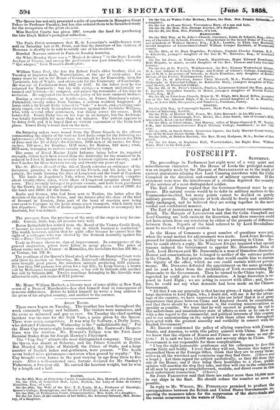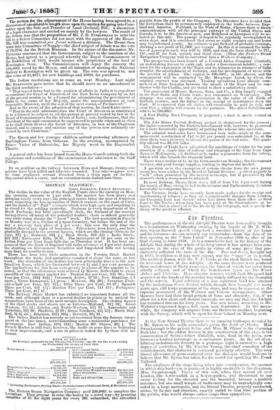POSTSCRIPT.
SATURDAY.
The proceedings in Parliament last night were of a very quiet and miscellaneous character. In the House of Lords the principal matter was an inquiry made by the Marquis of BREADALBANE as to the truth of current statements alleging that Lord Canning interferes with Sir Colin Campbell in the direction and conduct of military operations. If the statement were true the interference of a civilian deprived the country of the services of a most distinguished soldier. The Earl of DEBBY replied that the Governor-General must be su- preme. His natural course would be to defer in military matters to the Commander-in-chief, but many points cannot be decided on purely military grounds. The opinions of both should be freely and confiden- tially exchanged, and he believed they are acting together in the most cordial and confidential manner.
The Earl of ALBEMARLE was glad to hear the current rumours contra- dicted. The Marquis of LANSDOWNE said that Sir Colin Campbell and Lord Canning are both eminent for discretion, and these rumours could not have arisen from any revelation by either of the grounds of difference between them. Reports of the kind referred to by Lord Breadalbane must be received with great caution.
In the House of Commons a great number of questions were put, when the usual motion for adjournment was made. Lord JOHN RUSSELL pressed for information as to the policy we are pursuing in China. Be- fore he could obtain a reply, Mr. WILLIAM Ewsirr inquired what special reasons induced the Government to appoint Mr. Duncombe Dean of York. Lord HOTRAM said Mr. Duncombe is a man of blameless character. Honest and conscientious, he belonged to neither of the extreme parties in the Church. He had private means that would enable him to sustain the dignity of the office, which no one could sustain without private means. Mr. DISRAELI defended the appointment on the same grounds; and he read a letter from the Archbishop of York recommending Mr. Duncombe to the Government. Then he turned to the China topic. He regretted he could give no fresh information. A large discretion is re- posed in Lord Elgin ; we are acting in concert with allies ; and, there- fore, he could not say what demands had been made on the Chinese Government.
"All that I can say generally is that having given—I think wisely—that large discretion to Lord Elgin, who I doubt not, will use it for the advan- tage of the country, we have expressed to him our belief that it is of great importance that peace between China and England should be established, and that there should be a termination to the existing misconceptions as speedily as possible. We trust that he will succeed in putting an end to this unfortunate and unsatisfactory state of affairs as soon as he can do so with a due regard to the commercial and political interests of this country and to our understanding on the subject with those allies who throughout have acted with the greatest sincerity and cordiality in concert with the English Government." Mr. BRIGHT condemned the policy of allying ourselves with France, Russia, and America, to settle this paltry quarrel with China. How do we know that the objects of Russia and France are the same as our ob- jects ? It is said we have 15,000 men and seventy ships in China. The Government is not responsible for these complications. " I beg the right honourable gentleman and his colleagues to face this matter fairly and boldly. I trust that they will not, because this legacy 15 bequeathed them at the Foreign Office, think that they are to array them- selves in all the wretched and verminous rags they find there. (Cheers and a laugh.) Let them regard the subject patriotically, as they did from this side of the House; and if they bring these hostilities to a close, public opinion will sanction the step they take, and they will rise in the estimation of all men by pursuing a straightforward, resolute, and direct course in this most unfortunate transaction." (Cheers.) Sir Jona: PARINGTON said that there are rather more than 10,-000 men in our ships in the East. He should reduce the number as soon as possible. reply to Mr. WirsoN, Mr. Frrzonalian promised to produce the correspondence between the British and United States Governments .re- specting the measures taken for the suppression of the slave-trade
the recent occurrences in the waters of Cuba.
The motion, for, the adjournment of the House having been agreed to, a discussion of cinaldekible length arose upon the motion for going into Com- mittee upon'tlie Sale and Transfer of Land (Ireland) Bill ; a discussion of a legal character and carried on mainly by the lawyers. The result of the debate was that the proposition of Mr. J. D. FITZGERALD to refer the bill to a Select Committee did not meet with the approval of the House. The bill was committed pro formit without a division. The House then went into Committee of Supply—the chief subject of debate was the vote of 79,2751. for the British Museum. In the course of the discussion Mr. Damara.' announced that the Government, subject to the sanction of the Rouse, had agreed to a proposal whereby the Royal Commissioners of the Exhibition of 1851 would become sole proprietois of the land at Kensington Gore. The Commissioners will repay the country the 180,0001. voted by the House, and all intention of moving the National Gallery to Kensington will be given up. The vote was agreed to, and also votes of 26,8871. for new buildings and 50001. for purchases.
The Indian resolutions are to come on next Monday. Last night Mr. GLADSTONE gave notice that he should move as an amendment to the third resolution- " That regard being had to the position of affairs in India it is expedient to constitute the Court of Directors of the East India Company by an Act of the present session to be a Council for administering the government of India in the name of her Majesty, under the superintendence of such responsible Minister, until the end of the next session of Parliament." And in the event of the adoption of that motion, he should also move- " That in the said administration the Court of Directors ao constituted to be a Council be subject to all the powers at present vested by law in the Board of Commissioners for the Affairs of India; and, furthermore, that the President of the said commission be empowered to preside when and so often as he shall think fit over the Court of Directors, in lieu of the Chairman thereof, and to assume and exercise any of the powers now ordinarily ex- ercised by such Chairman."
The Queen and her younger children arrived yesterday afternoon at Buckingham Palace from Osborne. In the evening, accompanied by Prince Victor of Hohenlehe, her Majesty went to the Haymarket Theatre.
A general order has been issued from the Horse Guards setting forth the regulations and conditions of the examination for admission to the Staff College.
By an accident on the railway betweeen Mona and Manage, twenty-one persons have been killed and fifty-two wounded. Two coke-waggons were by some negligent servant detached from a train upon an incline ; they moved down a curve, and an excursion-train dashed into them.



































 Previous page
Previous page